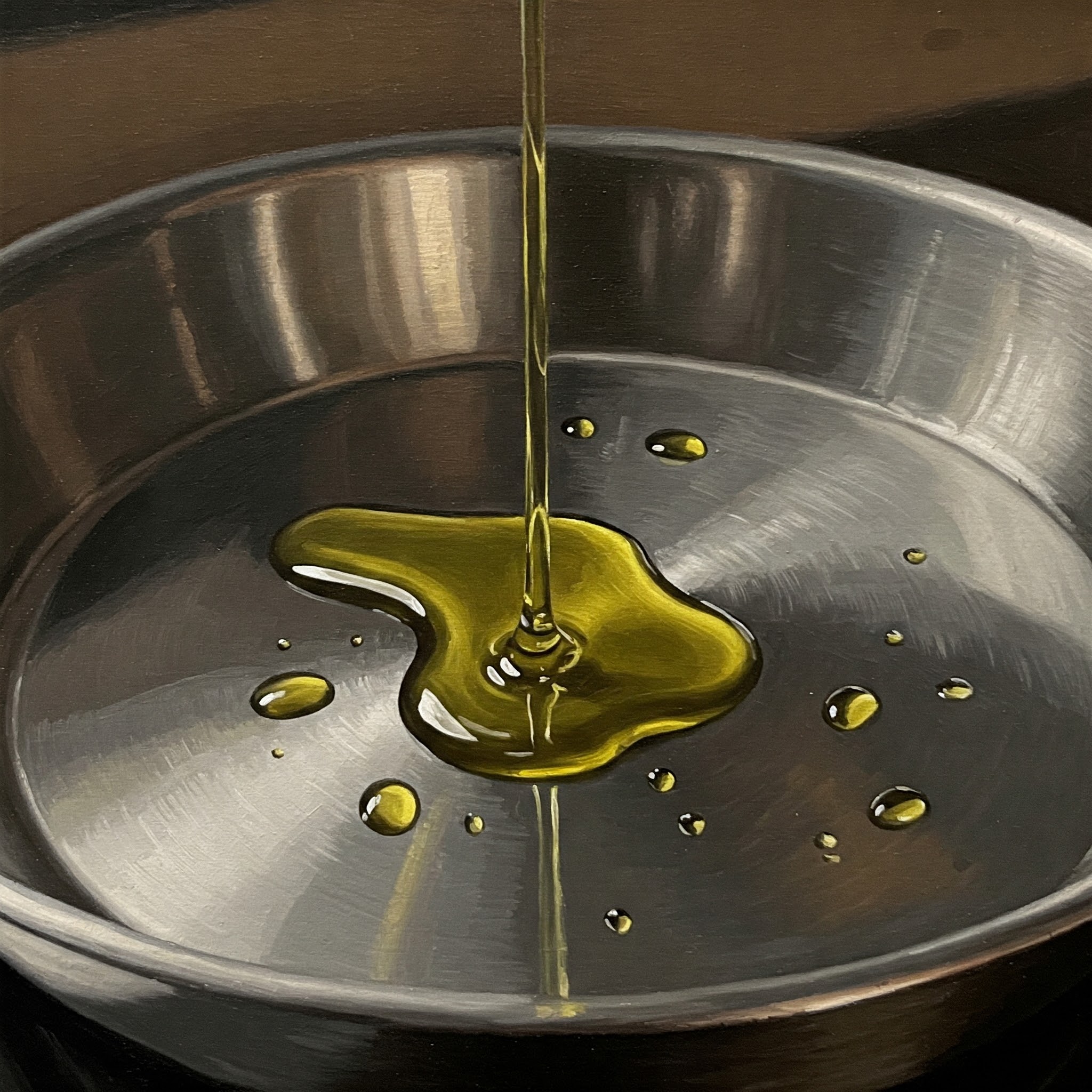Oil
Definition
The word oil refers to a viscous liquid derived from natural or synthetic sources, commonly used as a lubricant, fuel, or cooking ingredient. It can also function as a verb meaning to lubricate or apply oil.
Parts of Speech
- Noun
- Verb
Pronunciation
American English
- IPA Pronunciation: /ɔɪl/
- Respelling: OYL
British English
- IPA Pronunciation: /ɔɪl/
- Respelling: OYL
Etymology
The word "oil" originates from the Old French "oile," which itself comes from Latin "oleum," meaning "olive oil," derived from Greek "elaion" (olive tree). Initially associated with olive oil, its meaning expanded to include other viscous substances.
Derivatives
- Oily (adjective)
- Oilfield (noun)
- Oilskin (noun)
- Oiliness (noun)
- Oilcloth (noun)
Synonyms
- Lubricant
- Grease
- Petroleum
Antonyms
- Water
- Dryness
- None
Usage
The term "oil" is widely used in various contexts, from cooking and machinery to energy and skincare. For example, "He added a few drops of olive oil to the salad" or "The engine needs to be oiled regularly."
Related Terms
- Petroleum: A natural, flammable liquid used as a fuel source.
- Grease: A thicker lubricant often derived from oil.
- Lubricant: A substance used to reduce friction.
Detailed Definitions
Noun
- A viscous liquid derived from natural or synthetic sources: Refers to substances such as vegetable oil, mineral oil, or crude oil.
- Example: "The pan was coated with a thin layer of oil."
- A fuel derived from petroleum: Refers to refined oils used in machinery and engines.
- Example: "The car runs on diesel oil."
- A metaphor for smoothness or flattery: Refers to expressions or actions used to persuade or appease.
- Example: "His words were full of oil and charm."
Verb
- To lubricate with oil: Refers to applying oil to reduce friction or wear.
- Example: "You should oil the hinges to prevent squeaking."
- To apply oil for preservation or appearance: Refers to using oil to protect or enhance.
- Example: "She oiled the wooden furniture to keep it polished."
oil



🇨🇳 Mandarin
- 油 (Yóu) - general term for oil
- IPA: /joʊ̯˧˥/
- English respelling: yo
- 石油 (Shíyóu) - meaning petroleum, a type of oil
- IPA: /ʂʐ̩˧˥ joʊ̯˧˥/
- English respelling: shi-yo
🇮🇳 Hindi
- तेल (Tel) - general term for oil
- IPA: /t̪eːl/
- English respelling: tayl
- पेट्रोलियम (Petroleum) - meaning petroleum, a type of oil
- IPA: /peːt̪roːliːjʊm/
- English respelling: pe-tro-li-yum
🇪🇸 Spanish
- Aceite - general term for oil
- IPA: /aˈθeite/ or /aˈseite/
- English respelling: a-thei-te (Spain), a-sei-te (Latin America)
- Petróleo - meaning petroleum, a type of oil
- IPA: /peˈtroleo/
- English respelling: pe-tro-leo
🇫🇷 French
- Huile - general term for oil
- IPA: /ɥil/
- English respelling: hwi-le
- Pétrole - meaning petroleum, a type of oil
- IPA: /petʁɔl/
- English respelling: pe-trol
🇸🇦 Modern Standard Arabic
- زيت (Zayt) - general term for oil
- IPA: /zajt/
- English respelling: zayt
- البترول (Albitrūl) - meaning petroleum, a type of oil
- IPA: /albitruːl/
- English respelling: al-bi-trul
🇧🇩 Bengali
- তেল (Tel) - general term for oil
- IPA: /t̪el/
- English respelling: tel
- পেট্রোলিয়াম (Petroleum) - meaning petroleum, a type of oil
- IPA: /peʈɹoliam/
- English respelling: pe-tro-li-yam
🇷🇺 Russian
- Масло (Maslo) - general term for oil
- IPA: /ˈmaslə/
- English respelling: mas-lo
- Нефть (Neft') - meaning petroleum, a type of oil
- IPA: /nʲeftʲ/
- English respelling: nyef-t
🇵🇹 Portuguese
- Óleo - general term for oil
- IPA: /ˈɔlju/
- English respelling: o-lyu
- Petróleo - meaning petroleum, a type of oil
- IPA: /pɨˈtɾɔlju/
- English respelling: pe-tro-lyu
🇮🇩 Indonesian
- Minyak - general term for oil
- IPA: /miɲaʔ/
- English respelling: min-yak
- Minyak bumi - meaning petroleum, a type of oil
- IPA: /miɲaʔ ˈbumi/
- English respelling: min-yak bu-mi
🇩🇪 German
- Öl - general term for oil
- IPA: /œl/
- English respelling: uhl
- Erdöl - meaning petroleum, a type of oil
- IPA: /ˈeːɐ̯dˌøːl/
- English respelling: air-duhl
🇯🇵 Japanese
- 油 (Abura) - general term for oil
- IPA: /a.bɯ.ɾa/
- English respelling: a-bu-ra
- 石油 (Sekiyu) - meaning petroleum, a type of oil
- IPA: /se.ki.ju/
- English respelling: se-ki-yu
🇻🇳 Vietnamese
- Dầu - general term for oil
- IPA: /ɗâːw˧˩/
- English respelling: dau
- Dầu mỏ - meaning petroleum, a type of oil
- IPA: /ɗâːw˧˩ mɔ˧˩/
- English respelling: dau mo
🇰🇷 Korean
- 기름 (Gireum) - general term for oil
- IPA: /ɡi.ɾɯm/
- English respelling: gi-reum
- 석유 (Seogyu) - meaning petroleum, a type of oil
- IPA: /sʌ.kju/
- English respelling: so-gyu
🇹🇷 Turkish
- Yağ - general term for oil
- IPA: /jaː/
- English respelling: ya
- Petrol - meaning petroleum, a type of oil
- IPA: /peˈtɾol/
- English respelling: pe-trol
🇵🇰 Urdu
- تیل (Tail) - general term for oil
- IPA: /teil/
- English respelling: tail
- پٹرولیم (Petroleum) - meaning petroleum, a type of oil
- IPA: /pɛt̪ɾolɪjʊm/
- English respelling: pe-tro-li-yum





